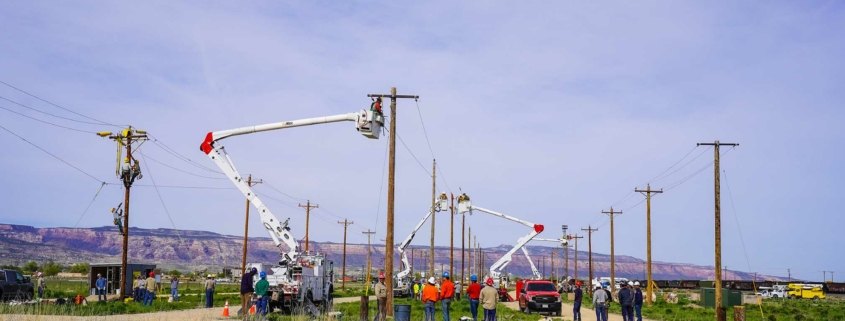By Amy Higgins, Photography by Joshua Scott Smith –
On May 1, lineworkers from across America gathered in Grand Junction at Mesa Hotline School to strengthen their skills and network with industry professionals.
This was the first of two weeklong training sessions at the esteemed electrical lineworker school and where its latest asset was introduced: a new 26-acre field outfitted with a legion of power poles, underground and above-ground lines, and all the necessary components to create a powerful learning experience.
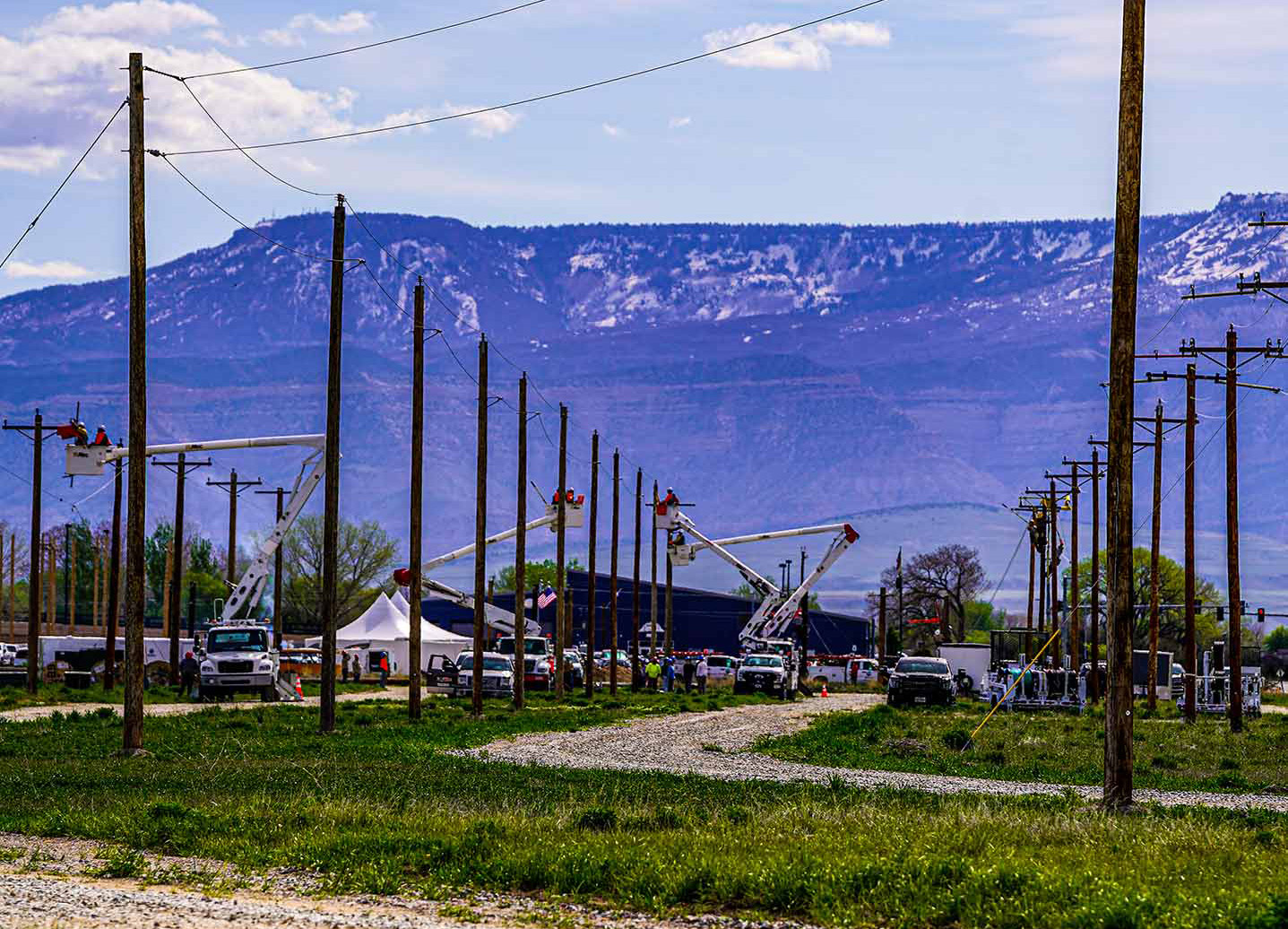
The Aerial Gloving, Hot Tension Stringing and Hot Sticking II classes are taught at the new 26-acre field at Mesa Hotline School in Grand Junction.
Mesa Hotline School personnel put in countless hours amending the field design plans before coming up with a blueprint of the finished product.
“We built a complete new field between multiple companies,” said Mesa Hotline School Board Assistant Secretary/Treasurer and Holy Cross Energy Glenwood Line Operation Manager James Ray. Several businesses generously donated equipment and manpower to ready the field for the students’ arrival. Essentially, a forest of power poles readied for climbing, testing and inspecting was firmly planted as the centerpiece of this massive real estate.
“I was delighted to see so much of it completed in a short period of time after we began construction,” said Holy Cross Energy President and CEO Bryan Hannegan. “Everyone appreciated the thoughtful and realistic design of the field, which made class instruction efficient and effective.”
THE RIGHT STUFF
Founded in 1966, Mesa Hotline School is a highly accredited lineworker school led by industry experts who teach lineworkers of all aptitudes ways to sharpen their skills and learn the more difficult tasks involved their craft.
Approximately 80 top-notch linework experts from CREA, America’s electric cooperatives and other energy entities donated their time and expertise during the two weeklong programs, and without financial incentive. These partnerships personify the cooperative principle “Cooperation Among Cooperatives,” a characteristic that noticeably branches beyond the cooperative network and toward the entire linework profession.
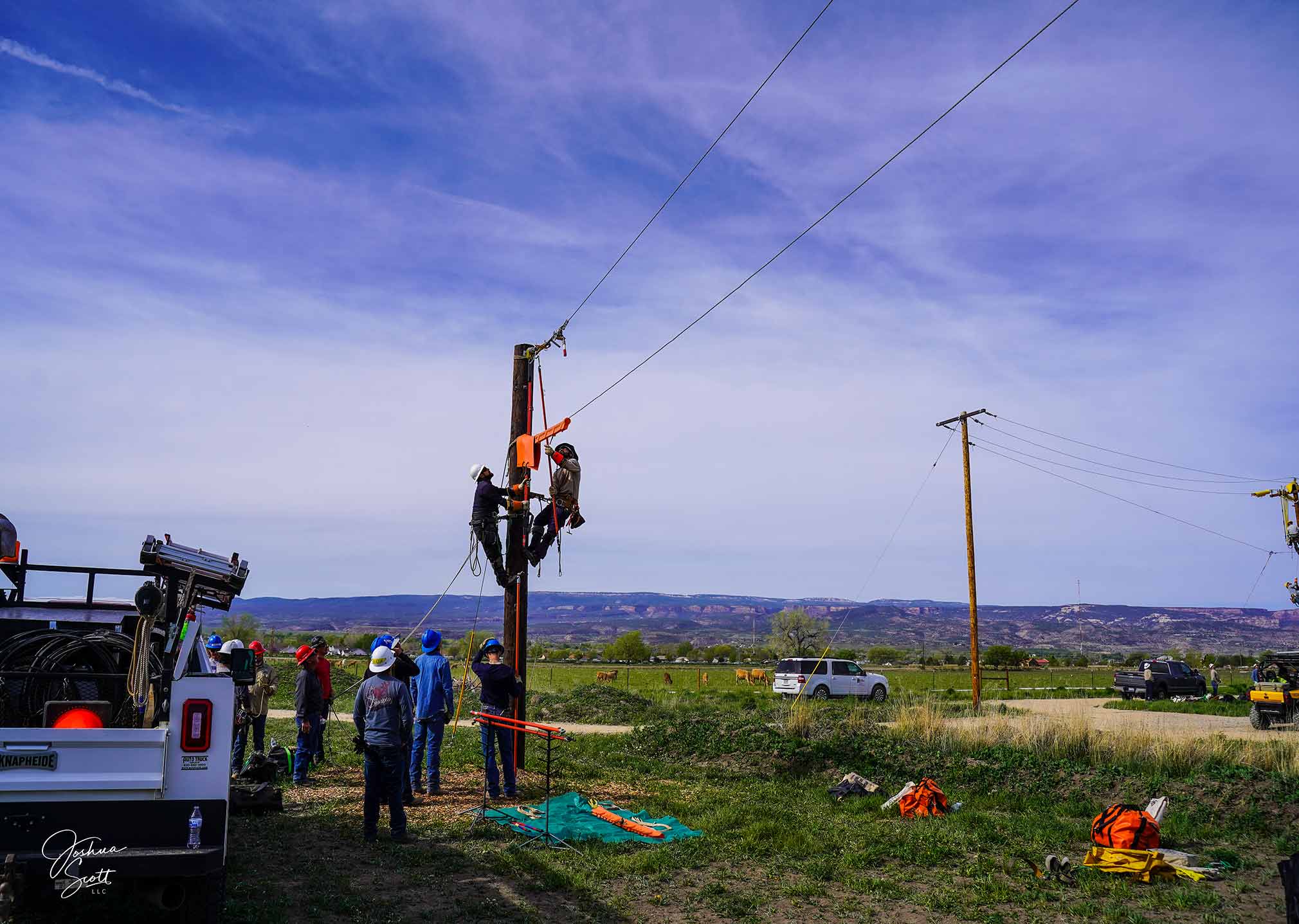
City of San Marco linemen AJ Longoria and Sammy Clark teach students how to change out a dead end insulator during the Hot Sticking I class.
“That’s really how our trade works,” explained David Williams, Mesa Hotline School Board President and Operations Superintendent at Mountain View Electric Association’s Limon office. “We depend on each other to bring [students] to the same level that the other guys got to; you’re getting the best of what those companies have to offer.” Students at Mesa Hotline School can register for hot sticking, aerial gloving, hot tension stringing, installations, switching and troubleshooting, or cable testing and fault locating courses. As they learn new techniques, a field safety committee ensures students are employing best practices to secure their wellbeing and the wellbeing of others. The course involves two days of in-class instruction, two days in the field, and a banquet where students are lauded for their hard work.
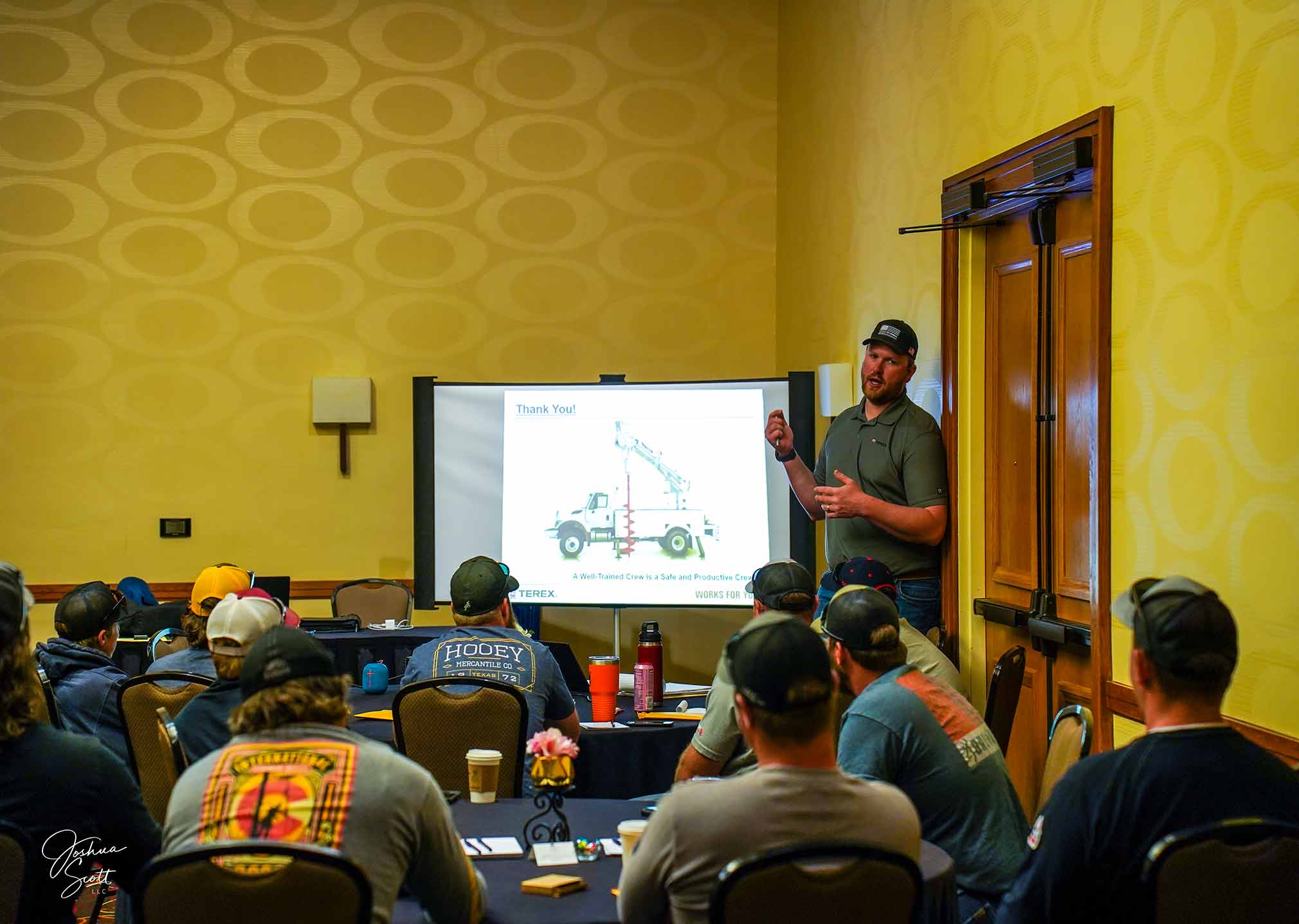
Erik Dahl teaches digger derrick best practices in the classroom portion of hotline school.
“That’s the biggest thing about hotline school: the relationships that you’re able to afford,” CREA Job Training and Safety Instructor Curt Graham said. “You always meet new people and learn different ways of doing things, so the network of people and things that you can put together over there is just beyond — it’s just incomprehensible — what you can do.”
While the new field currently offers immense amenities for its students, transmission and an additional substation are in the works to enrich the site.
“I think by the time we’re done it’ll probably be, if not the best, one of the best hotline schools in the nation,” Ray said.
A CLASS OF THEIR OWN
This year, around 600 lineworkers from consumer-owned and publicly-traded utilities and their contractors attended Mesa Hotline School. They advanced their skills learning new techniques and putting those skills into action, such as handling, maneuvering and working on energized conductors; stringing and pulling in new conductor to retire old conductor; troubleshooting cables and circuits; and learning how to locate an underground fault with different types of equipment.
“Nothing is live in the training. We simulate it but we treat it and talk about it just as if it was [energized],” Williams explained.
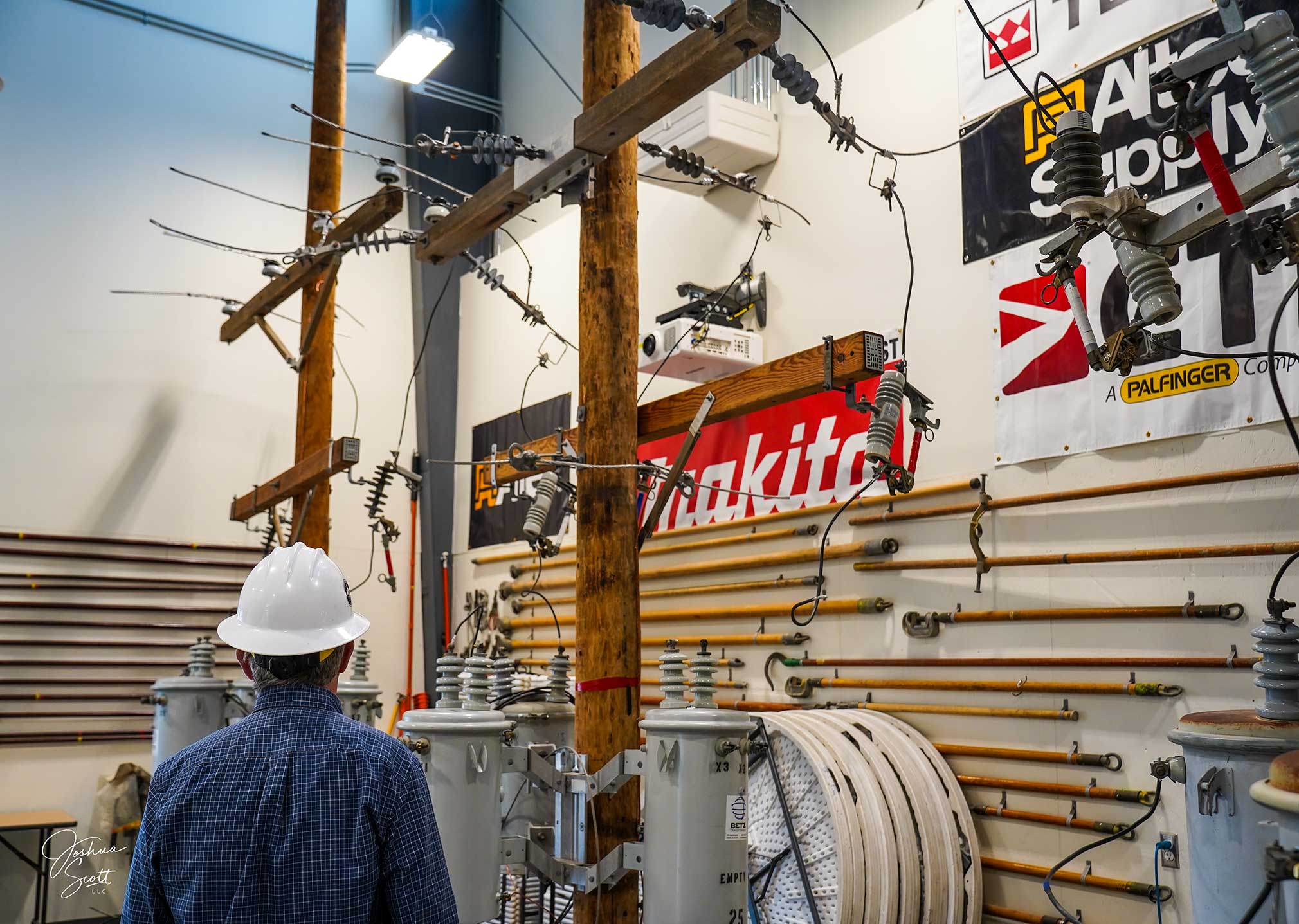
Mesa Hotline School Board President David Williams inspects the transformer training station.
America’s electric cooperatives know it takes grit to commit to the electrical linework profession and are keenly aware of the sacrifices that come with the job. “If the weather’s ugly and there’s lightning in the air and snow blowing sideways at 50 miles an hour, we’re out there, and I think it does take a special someone to want to do that,” Williams said.
Electrical lineworkers are in demand and the compensation it provides is substantial and continues to increase as their skills grow.
Mesa Hotline School, its partner companies and various vendors offer tuition assistance for lineworker training. There are approximately 10 $1,500 student scholarships and a $3,000 Mike Dean Memorial post-graduate scholarship. People who want to enter the lineworker profession can apply for these scholarships to attend any accredited lineworker program.
Whether it’s intimidation, uncertainty or time constraints, many people miss out on these financing opportunities simply because they don’t apply. “It always surprises me how few applicants we really get,” Williams said. “I would think we would get hundreds, but we don’t.”
Colorado’s electric cooperatives understand the significance of education and desire lineworkers who commit to furthering their skills and staying on top of the latest techniques and practices throughout their career.
“To me, that is the biggest thing that hotline school is about,” Graham shared. “You can always learn something new no matter how long you’ve been in this business.”
Amy Higgins is a freelance writer who has reported on electric industry topics for more than a decade.

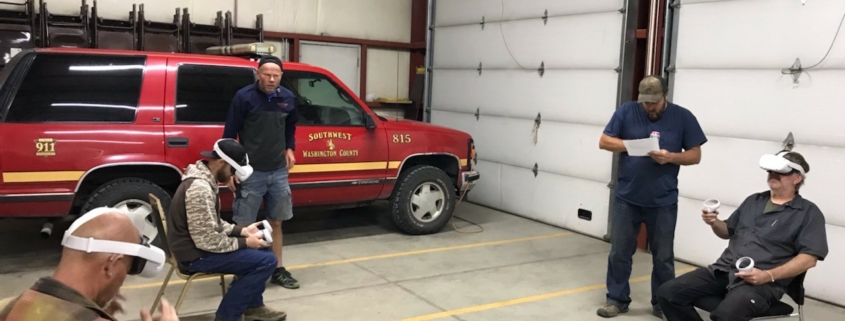
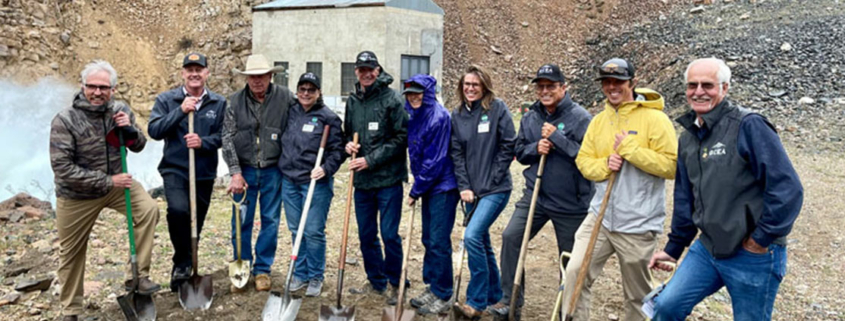 GCEA 2023
GCEA 2023